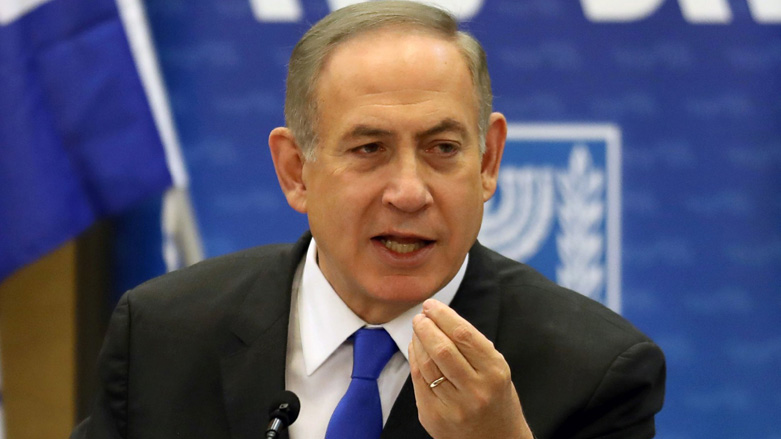Netanyahu warns of Iran in Iraq, Syria, and Lebanon

WASHINGTON DC, United States (Kurdistan 24) – Israeli Prime Minister Benjamin Netanyahu warned of Iran’s growing presence in Iraq, Syria, and Lebanon in a joint press conference Sunday with French President Emmanuel Macron.
“President Macron and I agree that we must stop the main source of aggression in the Middle East, which is Iran,” he told reporters in Paris.
“Iran is all over the place. It’s in Iraq. It’s in Syria,” Netanyahu said.
“It’s already in Lebanon, where the President is valiantly trying to change the situation,” he stated, explaining that Israel appreciated and supported the efforts of the Lebanese leader to restrict Tehran’s influence in his country.
In essence, Netanyahu was warning about the Iranian land bridge to the Mediterranean that threatens to emerge from the disorder in Iraq and Syria generated by the fight against the Islamic State (IS) and by Syria’s civil war.
The Israeli Prime Minister did not describe Iran’s presence in Iraq in any detail, but, presumably, he has in mind the powerful Iranian-backed Shia militias there.
On Dec 2, when the Prime Minister of the Kurdistan Regional Government (KRG), Nechirvan Barzani, visited Paris, along with the Deputy Prime Minister, Qubad Talabani, Macron called for the gradual dismantling of those militias.
Macron was soon seconded by the German Foreign Minister, Sigmar Gabriel, who called on Baghdad to “move away from the rule of sectarian militias.”
However, the State Department, which has the lead on US policy toward Iraq, dismissed the French and German concerns when Kurdistan 24 asked for comment about them.
Spokesperson Heather Nauert responded that the militias fell under the control of Iraqi Prime Minister Haidar al-Abadi. “Whether or not other countries like that or don’t like it, it is Iraqi law, and we believe in sovereignty,” she said.
With Macron at his side, Netanyahu described two new aspects of the Iranian threat to Israel.
Iran is entrenching itself “militarily, with land forces, air forces, and naval forces in Syria,” he stated, “with the express purpose of fighting and destroying Israel.”
The Prime Minister also explained that Iran was trying “to put inside Lebanon, game-changing missiles”—precision-guided missiles, which it is seeking to manufacture there.
“That could be a great danger to Israel, its cities, and its people,” Netanyahu said.
“We look towards responsible leaders and to important leaders,” he concluded, “to help us roll back this aggression.”
Netanyahu was also asked about Turkish President Recep Tayyip Erdogan’s criticism of Israel as “a state of terror.”
The Prime Minister responded, “I’m not used to receiving lectures about morality from a leader who bombs Kurdish villagers in his native Turkey, who jails journalists, who helps Iran go around international sanctions, and who helps terrorists, including in Gaza, kill innocent people.”
Editing by Nadia Riva
